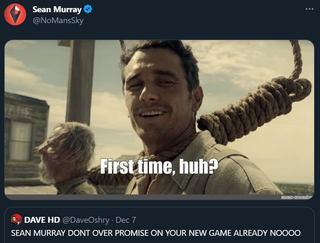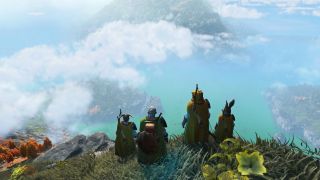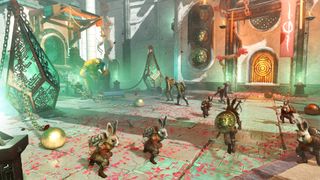Sean Murray is risking another No Man's Sky launch disaster, but he knows exactly what he's doing and it's kinda genius marketing
Hello Games is playing with fire, but it worked so well last time, can you really blame 'em?
Hello Games founder Sean Murray didn't have to go on The Game Awards and declare that the studio's next game, Light No Fire, would take place on a planet that's "bigger than earth" and "as varied as a universe." His words didn't get away from him in a Molyneux sort of way: He knows he's repeating No Man's Sky history with a new set of audacious promises, and has actually leaned into the notion that he's living dangerously, reposting memes that poke fun at the No Man's Sky deja vu.
"SEAN MURRAY DONT OVER PROMISE ON YOUR NEW GAME ALREADY NOOOO," joked New Blood CEO Dave Oshry after the trailer debuted, to which Murray responded with a still from The Ballad of Buster Scruggs showing James Franco with a noose around his neck, an image commonly used on the internet to express resigned acceptance of one's fate.

As Robin pointed out, promising an open world adventure game "set on a fantasy planet the size of Earth" that "brings the depth of a role playing game to the freedom of a survival sandbox" really is a risky choice. I already don't think Hello Games will meet all the expectations it just manifested.
As a marketing tactic, though, it sure is working. By owning its No Man's Sky mistakes and then threatening to repeat them, Hello Games has made itself into a sort of game development daredevil. Like a guy trying to jump over ten buses, you want to see the small studio succeed and everyone cheers when it does—fans even put up a billboard to thank Hello Games for sticking with No Man's Sky—but the whole event is only thrilling because we know there's the possibility of an explosion.
The risk is slightly mitigated this time: Because Hello Games earned itself a No Man's Sky redemption narrative, there's a sense that even if Light No Fire disappoints at launch, we just have to wait a few years and it'll evolve into something better. The goodwill the studio has accrued is its safety net.
But maybe it doesn't even need it: Hello Games obviously didn't have a safety net when No Man's Sky launched and it still managed to survive, because despite all the upset, the game sold well. So, really, why not do it again?

Missing details
Reluctant as I am to encourage reckless hype building, I have to admit I've enjoyed Murray playing up his hopelessly incorrigible game dev persona. It's hard to fault him for being too ambitious—it wouldn't have been any fun if he'd come on stage and said, "Gee, sorry about last time, we'll make a regular game now"—and he never comes across as disingenuous. It seems like he's being himself, someone who really wants to make sandbox games that attract impossible expectations.
Comic deals, prizes and latest news
Sign up to get the best content of the week, and great gaming deals, as picked by the editors.
One nitpick about this "oops, we're doing it again" approach, though, is that they maybe shouldn't do everything again.
A big No Man's Sky blunder was that players thought they'd actually be able to meet other players out in the universe, and at launch, that wasn't the case. This time, Hello Games said upfront that Light No Fire is a multiplayer game, so we don't have to wonder about that, but "multiplayer" can mean a lot of things, and Murray's big promises at The Game Awards didn't establish the facts clearly.

"[Light No Fire is] the first real open world," Murray said. "Something without boundaries. And we're going to let everyone play in it together."
You could easily interpret that last statement to mean that it's a one-server MMO like EVE Online, but based on what we see in the trailer—a small group of players building a settlement, fighting monsters, riding dragons and horses—it looks more like a co-op experience with a handful of players per world.
It had a lot more problems than this, but we just saw The Day Before get pancaked by negative launch reviews in part because the developers didn't precisely describe its multiplayer structure. Playing with fire, Murray!
An irresistible premise
What Hello Games can't tell us before we play Light No Fire is whether or not standing atop the fifth procedurally generated mountaintop we find is going to be any fun. Some of those peaks will be "taller than Everest," says Murray, because of course he had to outdo the earth, but I don't know of any principle of game design involving a correlation between tallness and fun.
As much as angry No Man's Sky early adopters latched onto what they saw as broken promises, such as the absence of multiplayer, I think the core disappointment was that it just didn't bring about the sense of wonder they'd hoped it would. And yet, the idea of exploring an enormous, uncharted game world full of genuine surprises is so enticing that, even though I never developed a lasting interest in No Man's Sky, I can't help but feel a little Light No Fire hype myself. So here we go again.

Hello Games offers us an almost irresistible premise: That an underdog studio is once again going to try to make the kind of game others have only dreamed about, and this time it might actually have the experience to pull it off. If Light No Fire doesn't turn out to be the greatest videogame of the decade, it might at least get to claim the award for best marketing gambit, and maybe it'll sell well enough to earn the years of post-launch support No Man's Sky has.
That's not to say there wasn't any promising substance to the trailer. Light No Fire's fantasy world stood out from the crowd at The Game Awards with Hello Games' distinctive, colorful foliage, plump creatures, and cute characters. I want to meet some of those rabbit-folk, stat.
While I wait, maybe I'll spend every evening imagining how those characters will fit into the world and interact with me, so that by the time Light No Fire releases I've constructed an entire game in my head that there's no way the real thing could possibly live up to. Just for old times' sake.

Tyler grew up in Silicon Valley during the '80s and '90s, playing games like Zork and Arkanoid on early PCs. He was later captivated by Myst, SimCity, Civilization, Command & Conquer, all the shooters they call "boomer shooters" now, and PS1 classic Bushido Blade (that's right: he had Bleem!). Tyler joined PC Gamer in 2011, and today he's focused on the site's news coverage. His hobbies include amateur boxing and adding to his 1,200-plus hours in Rocket League.
Most Popular



